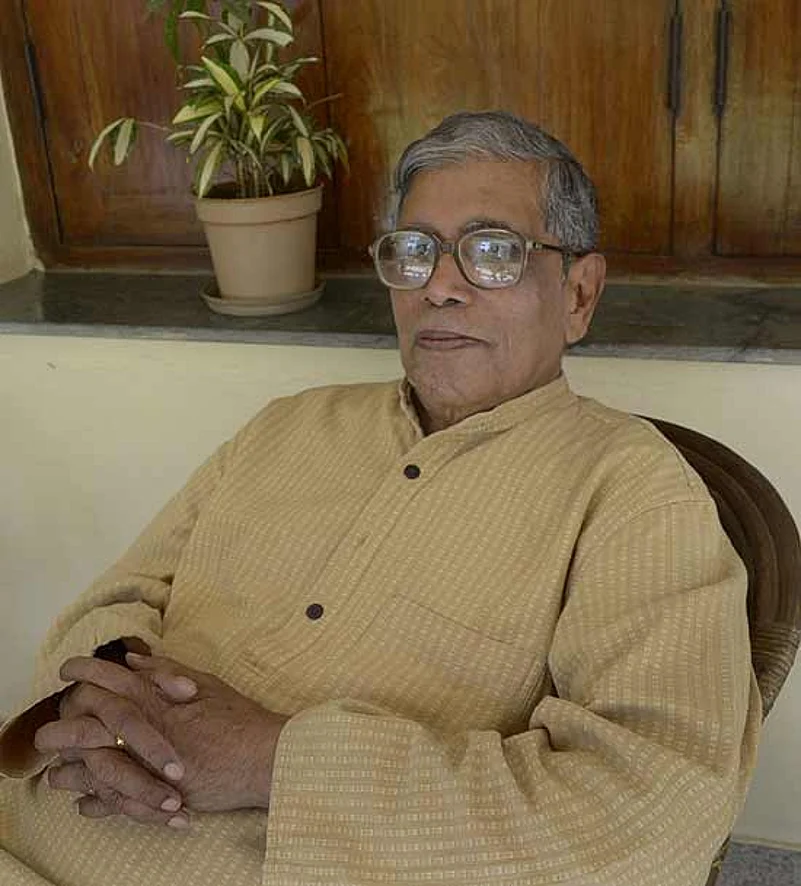Jayanta Mahapatra is one of India’s leading and most prolific English-language poets. After his substantial The Lie of Dawns: Poems 1974-2008 (2009), Land (2013) is his latest offering.
Land is a slim volume of tightly wrought, evocative poems of longing and desire; about his native Cuttack, history and politics. Most specifically, the book shows how the poet effortlessly makes the very local universal.
Jayanta Mahapatra has a light, languorous touch now recognisable to a discerning ear. His lyrical signature is full of specific cadences and evocative modes. The rural and the urban, literature and art, memory and present, all jostle in a choreographed, balanced way.
But ultimately his poetry is wise and startling. Take the opening of Under the Drift of Mild Moons: “Here, in this brooding valley,/Lying under the drift of mild moons,/The air sits like a god, bare-headed and awake;/It hangs on a blade of grass for a moment,/Urging all that hidden sadness into solitude.”
In the concluding poem, Ten Years, Past 9/11, he does not refer directly to the terror attacks. Instead, he chooses a philosophical stance using the memory of his dead father and filial equations that translate into wider community relations. It is a poem of great wish, of yearning, a plea for sensitivity and peace. “Someday the world/will be worth the poem I write”, he ends.
I strongly feel it is high time a major publisher published a proper, critically edited ‘collected poems’ of Jayanta Mahapatra. Students study him, readers read him, poets admire him; yet there are no mainstream, easily available editions of his oeuvre. It is time that changed.
Land is an immensely fulfilling and satisfying book, a worthy addition to Indian poetry shelves, and definitely worth the Rs 125.
Sitakant Mahapatra (no relation of Jayanta) is another major Oriya poet who writes in his native Oriya and often translates his own work into English. He has published 25 volumes in the original Oriya, 14 in English translations, and over a dozen in non-Indian languages. Many past editions of his English translations have been done by others like Jayanta Mahapatra, Bibhu Padhi and Bikram Das. His newest book is Memories of Time: Selected Poems. It is a representative selection from his eight previous collections—Song of Khubja (1980), Death of Krishna and other poems (1991), The Ruined Temple and other poems (1996), Bharatvarsa (2009) and others—along with a clutch of 13 new poems.
‘For time is both loss and memory’ (Jorge Louis Borges) acts as an epigraph to this new book. The title is an appropriate aggregation of memories over time spanning 50 years. His poems are replete with the history of human grief, local culture, and simple scenes such as The Sunset in a Bus Rearview Mirror that evocatively details: “The dahlia’s blazing yellow petals drop,/the sun sets in the bus rearview mirror,/the zone of glass aflame like Manisha’s cheeks,/the shadow of scarlet rose on silver screen”.
There are poems about the poet’s grandparents, his son Munu and his grandson Adu. He ‘journeys through the Rocky Mountains’ and Kargil and other landscapes. There are scenes of ‘The Pumpkin Planters’, ‘Worshipping the Goddess’, about ‘The Song of Khubja’, and about religion and mythologies.
Sitakant Mahapatra’s poems are also informed by his deep sense of tribal culture and its intricate social and linguistic nuances. He is able to infuse his own poems with the authentic music of the local. His many years of research and translating tribal and oral poetry are reflected in his own art, thus making it anthropologically richer.
But ultimately, his heart returns to ‘Orissa’ again and again, the landscape of his umbilical connect: “When the feet step over the doorsill/and step out, one can see/these baula branches bending under/the east wind, the scent/of the baula flowers”.
The poet’s strength is his painterly strokes of his native land, where “At the door of the ruined temple/a lone beggar sings the evening prayer/and, as if responding to it,/an ailing half-dead dog and his philosophic goat/quietly move out of the temple”. Memories of Time is a fine selection of the representative work of Sitakant Mahapatra within the spine of one handy volume.
(Sen’s books include: The HarperCollins Book of English Poetry, as editor, and Fractals: New & Selected Poems)






















